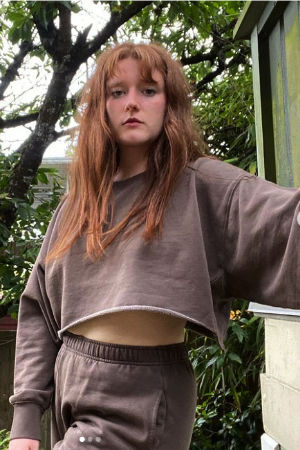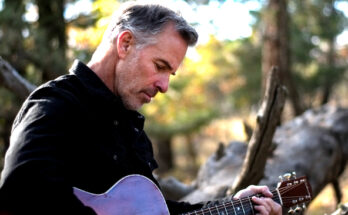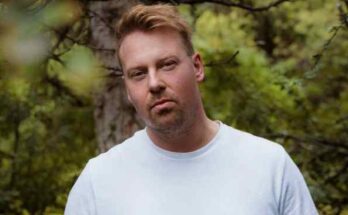 Indie Pop artist Kenzie Cates releases her new single ‘Just Ain’t You’ on today via all streaming platforms. Co-written by JUNO Award Winning Ryan Stewart (Carly Rae Jepsen, Tyler Shaw), ‘Just Ain’t You’ is all about trying to get back into the dating field when you aren’t over your ex yet. Written after a bad relationship and series of even worse dates, the song is about that whole date feeling like a waste of time when I knew I could have just been spending more time with that other person instead. Covertly, the song is a celebration of that unwillingness to settle for anything less than something great.
Indie Pop artist Kenzie Cates releases her new single ‘Just Ain’t You’ on today via all streaming platforms. Co-written by JUNO Award Winning Ryan Stewart (Carly Rae Jepsen, Tyler Shaw), ‘Just Ain’t You’ is all about trying to get back into the dating field when you aren’t over your ex yet. Written after a bad relationship and series of even worse dates, the song is about that whole date feeling like a waste of time when I knew I could have just been spending more time with that other person instead. Covertly, the song is a celebration of that unwillingness to settle for anything less than something great.
Please take a moment and give us some background info about becoming an artist?
Growing up, I always felt like I had all these big, overwhelming feelings, and I needed outlets to express myself. When I was quite young (like 6 or 7 years old), I would often take artists’ songs and rewrite the lyrics to express something I was feeling as a way of coping. As I got older, I started experimenting with my own melodies too while continuing to rely on songwriting as a coping mechanism for the trials and tribulations of growing up, almost as if I were keeping a diary. Anytime I was in pain—if somebody did something hurtful to me, or I felt left out—I was comforted knowing that I would be able to transmute that pain into a song later. I guess I just never really broke that habit of using songs to process my feelings, so I’m still at it to this day. The main difference is that now, I get to call that habit “being an artist,” which is cool.
In which direction is your music heading?
Personally, I think musical direction is alchemical; I don’t think artists ultimately control it. For independent artists in particular, I think it’s negotiated between artist and producer, and emerges from the combination of a number of factors: finding a producer whose work you like and who also likes yours, and the producer’s success in balancing what a song needs to shine with who they think you are as an artist. Obviously, artists can impact some of those things, but at the end of the day, I believe a huge component of musical direction is left to chance—it’s just meeting the right producer at the right time. My own musical direction is the result of a lot of trial and error with different producers. I don’t consciously plan my direction—I use songwriting to navigate the pains and joys of being alive, and the songs come how they come out. I don’t sit down at a drawing board, decide where I want to go, and then reverse engineer songs on the basis of that goal (though I do know that some artists work that way and I think that’s amazing. Good for them). I just feel a thing, turn it into a song to feel better and then take it to my producer and say, “pls make this slap.”

The back story behind your new single “Just Ain’t You.”
I had started writing the track on my own during a time when I was going on a bunch of Tinder dates, and I was waiting to finish it with a writer and producer in town named Ryan Stewart. I’d wanted to work with him for years because of his work with people like Carly Rae Jepsen and other very cool artists. I trusted him on a nearly spiritual level. We finally booked a session, and his contributions really elevated the song and brought it over the finish line. I took that demo to my producer in Nashville, Will McBeath, who built a track, which he then sent to me to record vocals. I contacted my gal pals, Kate and Lauren Kurdyak of Vox Rea, and they invited me to their magical cabin in East Sooke where we recorded all the leads and they even added some backup vocals to the track, in which they sound like perfect angels singing from the heavens (it’s easy to tell our vocal contributions apart because, in contrast with theirs, mine do not sound like angels singing from the heavens.) We sent Will about seven million harmony permutations, and a week or two later, Will sent me the final track with all seven million harmonies mixed in! Elisa Pangsaeng at CPS Mastering here in Vancouver mastered the track, and that was that. All remote, all good people, all good vibes.
Are any shows upcoming to showcase your talent?
No, but I have my fingers crossed for a post-pandemic, vaccinated summer of love absolutely brimming with gigs. People can follow me on social media and sign up to receive my newsletters to be the first to know if and when that happens.
There are many struggles being a musician at the moment. Can you name a few?
A struggle that I think about a lot as a musician and also as a citizen is women’s liberation. To put it plainly, women’s voices aren’t valued the way men’s are. There’s a double standard, so women have to work much harder to be taken seriously as artists and as intellectuals. On the one hand, our devaluation of women’s voices is quite literal: I don’t think there has ever been a woman playing on the radio who was as unskilled a vocalist as Bob Dylan, which isn’t to say people (myself included) don’t love his voice—it’s to say we would never accept, never mind grow to love, that degree of unskilled-ness from a woman on the same scale. The struggle is relentless, too; even when women’s voices do make the cut and end up in the spotlight, we jump at any opportunity to dispute her credibility (e.g. Lana del Ray’s SNL performance, or our obsession with women’s use of auto-tune as proof that she lacks genuine artistry). I think that the devaluation of women’s voices comes from a deep-seated cultural belief that women can only speak for women, but that men can somehow speak for all of humanity. Even if a woman had written and performed all of Bob Dylan’s with an incredible voice, I seriously doubt that we would have elevated her to visionary status the way we did with him. The artistry in the songs wouldn’t have been immediately evident to us in the same way; we would have had to look past a lot of subconscious misogyny first, and because that’s a lot of work, I’m not convinced that it would have ended in the same degree of fame. So that’s probably my biggest struggle, but in a strange way, I’m grateful that it’s not my struggle alone. Much love to my sisters, especially my BIPOC sisters who are subject to cross-cutting power hierarchies and who experience even higher barriers than I because of race, and the non-binary folk and men who stand with us in solidarity.
How have you been keeping creative during the Pandemic?
Life has continued to happen to me during the pandemic, so I’ve continued to write. Because I write when I’m feeling anything overwhelming that I need to process, I most often end up writing by myself, so the pandemic hasn’t really changed my creative capacities much.
Now that your single is out what are the plans for the rest of 2021?
Getting vaccinated, learning German, and releasing other new songs. I also work in the opioid crisis and expect to continue doing that work over the year ahead to combat opioid overdose fatalities (My advice: test your drugs, go slow, and never use alone—download the Brave app for remote overdose prevention anywhere in North America).
Is there anyone you would like to collaborate with in particular?
JP Saxe, Julia Michaels, and/or Marren Morris. I think they’re all really skilled writers in different ways and I would have SO much to learn from any one of them.
When you kick back who are some of the artists you listen to?
I’m obsessed with the song “Passive Aggressive” by Charlotte Cardin right now. I’m also listening to a lot of the Beatles at the moment, but that’s unusual—some of my typical go-to’s are JP Saxe, Lennon Stella, John Mayer, King Princess, Julia Michaels, Hozier, Maggie Rogers, and James Bay. I’m also lucky to be friends with a lot of talented artists whose music I genuinely love, like Vox Rea and Michaela Slinger.


